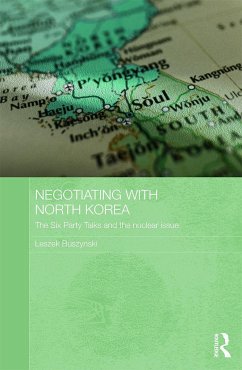The North Korean nuclear threat has created an enormous amount of apprehension in the international community in recent years. In 2003, the Six Party Talks brought together the US, China, Russia, Japan as well as South and North Korea to negotiate a multilateral resolution of this nuclear issue. This book examines this multilateral attempt, and will look at the Six Party Talks as a study of multilateralism, differentiating it from empirical studies on the Korean peninsula. The author discusses the positions of the major players in regard to the Korean Peninsula in terms of their views of multilateralism and their willingness to commit themselves to it. The book goes to question why multilateralism failed to achieve its stated purpose in this instance, and examines how this failure can be resolved in the future.
North Korea's nuclear weapons program has provoked much apprehension in the international community in recent years. The Six Party Talks were convened in 2003 to prevent North Korea from developing nuclear weapons. They brought together the US, China, Russia, Japan as well as North and South Korea in the effort to negotiate a multilateral resolution of North Korea's nuclear program but the parties had widely different views and approaches. This book will examine the Six Party Talks as a study in multilateral negotiation highlighting the expectations vested in them and their inability to develop a common approach to the issue. It holds out some important lessons for multilateral negotiation, diplomacy and dealing with North Korea.
Hinweis: Dieser Artikel kann nur an eine deutsche Lieferadresse ausgeliefert werden.
North Korea's nuclear weapons program has provoked much apprehension in the international community in recent years. The Six Party Talks were convened in 2003 to prevent North Korea from developing nuclear weapons. They brought together the US, China, Russia, Japan as well as North and South Korea in the effort to negotiate a multilateral resolution of North Korea's nuclear program but the parties had widely different views and approaches. This book will examine the Six Party Talks as a study in multilateral negotiation highlighting the expectations vested in them and their inability to develop a common approach to the issue. It holds out some important lessons for multilateral negotiation, diplomacy and dealing with North Korea.
Hinweis: Dieser Artikel kann nur an eine deutsche Lieferadresse ausgeliefert werden.








